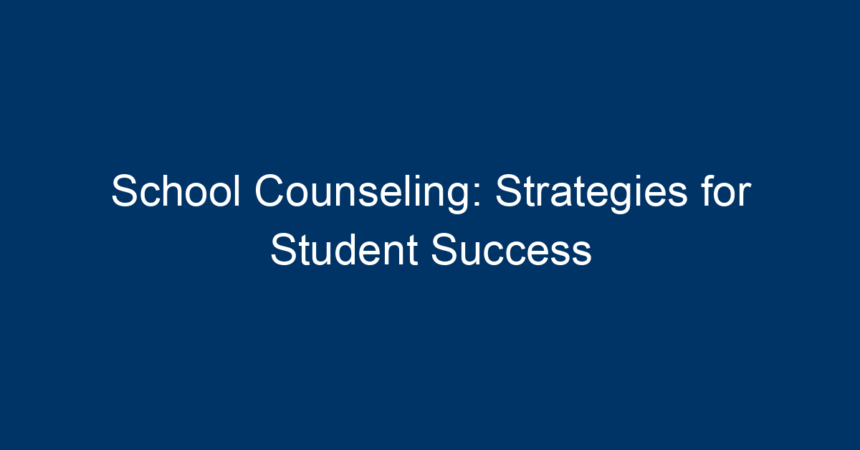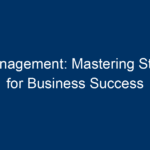In today’s rapidly changing educational landscape, the role of school counseling has never been more critical. School counselors serve as vital support systems, guiding students through academic, emotional, and social challenges. This comprehensive article explores effective strategies for student success within the framework of school counseling, providing actionable insights for educators, counselors, and parents.
The Role of School Counseling
School counseling goes beyond the traditional image of guidance offices where students come in for college advice. Modern school counselors wear many hats, including academic advisors, mental health advocates, and social skills mentors. By fostering a supportive environment, school counseling can enhance students’ overall well-being, leading to improved academic performance and emotional resilience.
Importance of School Counseling
- Academic Guidance: Providing support for course selection, study skills, and time management.
- Social and Emotional Support: Helping students navigate relationships, stress, and personal issues.
- Career Counseling: Assisting students in exploring career options, vocational training, and higher education pathways.
These roles underline the importance of school counseling in creating a holistic approach to student development.
Effective School Counseling Strategies
1. Personalized Student Development Plans
Developing individualized student development plans allows school counselors to understand each student’s unique strengths, weaknesses, and aspirations. By focusing on personalized goals, counselors can provide tailored resources and strategies that cater specifically to the needs of each student.
Key Actions:
- Conduct regular one-on-one meetings.
- Use surveys and assessments to gather insights into students’ interests and challenges.
- Revise and adapt plans as students evolve.
2. Implementing Social-Emotional Learning (SEL)
Integrating Social-Emotional Learning (SEL) into the school curriculum provides students with the tools to manage their emotions, set goals, and establish positive relationships. This foundational skill set is essential for overall student success.
Key Actions:
- Incorporate SEL principles in everyday classroom activities.
- Organize workshops focusing on mindfulness, resilience, and conflict resolution.
- Use role-playing scenarios to help students practice social skills.
3. Enhancing Communication Skills
Effective communication is a cornerstone of student success. School counselors can guide students in developing strong communication abilities, both verbal and non-verbal, essential for academic and social interactions.
Key Actions:
- Facilitate group discussions and peer feedback sessions.
- Teach students the importance of active listening.
- Encourage involvement in extracurricular activities like debate clubs or theater.
4. Fostering Collaborative Relationships
Building strong partnerships among students, parents, and educators enhances the effectiveness of school counseling. Collaboration ensures that every student receives consistent support from different facets of their educational journey.
Key Actions:
- Organize regular meetings with parents to discuss student progress.
- Create a mentorship program that links older students with younger peers.
- Engage faculty in professional development regarding student mental health and support.
5. Utilizing Data for Continuous Improvement
Data-driven decision-making in school counseling can lead to improved student outcomes. By analyzing trends and results, counselors can identify areas needing support and tailor their strategies accordingly.
Key Actions:
- Collect data on student attendance, behavior, and academic achievements.
- Use this information to adjust counseling approaches and implement targeted interventions.
- Share findings with the broader school community to foster transparency and collaboration.
Overcoming Challenges in School Counseling
Common Barriers
While school counseling is integral to student success, various challenges may hinder its effectiveness. Common barriers include:
- Resource Limitations: Budget constraints may limit the number of counselors available.
- Stigma: Students may feel embarrassed to seek help, leading to underutilization of services.
- High Caseloads: Counselors often manage large numbers of students, making personalized attention difficult.
Solutions to Challenges
Addressing these challenges requires innovative solutions:
- Advocacy for Resources: Counselors must advocate for additional funding and resources at the school and district levels.
- Awareness Campaigns: Building awareness around the importance of mental health and counseling can help reduce stigma.
- Group Counseling Sessions: Utilize group settings for counseling sessions to manage high caseloads while providing valuable support.
The Future of School Counseling
As education continues to evolve, school counseling must adapt to meet the changing needs of students. Emerging trends include:
- Telecounseling: The rise of virtual counseling provides flexible access to students, particularly in remote areas.
- Trauma-Informed Counseling: Emphasizing trauma-informed practices ensures that counselors approach student issues with empathy and understanding.
- Culturally Responsive Counseling: Adapting strategies to fit the diverse backgrounds of students fosters inclusivity and respect.
Actionable Insights for Students, Parents, and Educators
-
Students: Take the initiative to seek help when needed. Engage actively in counseling sessions and be open about your struggles.
-
Parents: Foster a home environment that values open dialogue about emotions and education. Encourage your children to utilize school counseling services when necessary.
- Educators: Support the work of school counselors by collaborating and sharing observations about students’ needs. Participate in training that emphasizes the importance of mental health and student support.
Conclusion
School counseling is an invaluable resource that equips students with the skills and support necessary for success in their educational journeys. By implementing effective strategies, overcoming common challenges, and adapting to future trends, school counselors can significantly enhance student well-being and performance.
The key lies in fostering a unified support system that recognizes each student’s unique potential while empowering them to navigate the complexities of school and life. Embrace the transformative power of school counseling, and let it pave the way for brighter futures.




